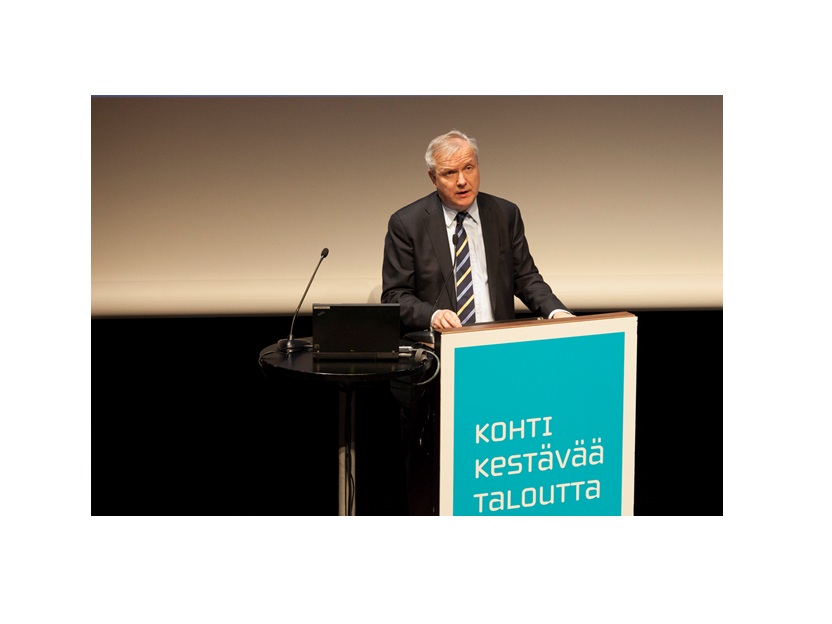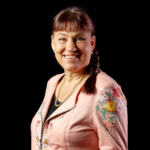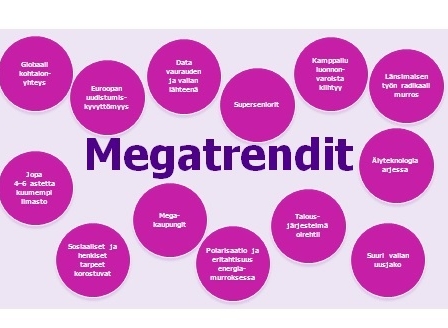The European Commissioner for Economic and Monetary Affairs, Olli Rehn, has spoken about his concern for the indebtedness rate within the European Union area. “In a short amount of time, public debt has increased by 30 percentage points. It is quite a heavy burden for future generations to bear,” said Mikkeli-born Rehn, who spoke on the subject at a seminar marking a new year of Sitra’s leadership training in sustainable economic policy.
During the economic crisis that began in 2008, the EU’s public debt increased from 60 per cent to 90 per cent of GDP, while in the eurozone, the public debt burden is currently 95 per cent. According to Rehn, we are headed for less turbulent times.
“Public debt is now stabilising and, according to Eurostat’s recent statistics, it is showing a downward trend. Most importantly, after the EU regulatory reform, financial policy not only works in theory, but also in practice,” said Rehn, who gave an introductory speech on the current economic state of Europe at the “Well-being challenges financial policy” seminar.
Rehn reminded the seminar participants that forecasts put the EU’s economic growth rate to be 1.5% in 2014, and slightly under 2% in 2015. “It is alarming that Finland has one of the slowest economic growth rates in Europe. We are struggling to keep up with Europe’s pace,” Rehn said.
He also said Finland needs to find new growth industries and drivers of growth, especially in the energy and environmental sectors. “It is not enough just to create opportunities for sustainable growth in Europe; our goal must be global influence. This can only be achieved through uniform EU action: shaping the global structures of the world economy and policy – and securing European well-being.”
The topics addressed at Sitra’s seminar included sustainable economic policy in Europe and discussing the possibility of solving problems related to labour demand, subsistence and well-being in Finland through participation income, a concept similar to basic income.
“We want to initiate more in-depth discussion on participation income, because it is a good example of a practical method for overcoming various challenges. Participation income adds a new layer to the conventional debate on basic income: it is a means to improve well-being through inclusion, individual initiative and meaningfulness,” said Sitra President Mikko Kosonen in his speech.
The participants of Sitra’s leadership training in sustainable economic policy have defined participation income as a key development target for economic policy. The concept of participation income is based on the idea of basic income, but with the addition that well-being arises from personal participation and meaningful action. Participation income would guarantee a basic income for citizens, but it would also require meaningful activity for the public good in exchange, such as informal care, childcare, helping neighbours or voluntary work.
The concept raised a lot of discussion amongst the seminar participants, both for and against.
“Participation income is a novel concept that boldly opens the debate and could help solve various problems, such as the sustainability gap, low employment rates and incentive traps,” said senior researcher Ohto Kanninen from the Labour Institute for Economic Research. “Currently in Finland, in many cases the amount of disposable income a person has does not increase when an unemployed person moves into work.”
Think tank Libera’s research director Elina Lepomäki was also in favour of developing the system into a more incentive-driven approach: “Our solution is more simplified, a basic account of sorts, which would encourage people to accept any type of work. It would be easier to adopt because it does not require any existing systems to be demolished, such as pension or taxation systems. It would be a reform purely based on social security.”
A known advocate of basic income, Osmo Soininvaara, MP, who participated in the seminar’s discussion panel, said that he understands where the idea for conditional participation income stems from, but finds it virtually impossible to implement or monitor. However, in Soininvaara’s opinion, unconditional basic income should definitely be tested in practice.
“Basic income should be a form of paying subsidies to low income employees. If a person can only earn 80 per cent of the income they need for their subsistence, it is more sensible for society to pay the remaining 20 per cent than a full 100 per cent, as is the case under the current system. Our old social security system is designed for long-term careers instead of today’s scenario of short-term job cycles,” said Soininvaara.
The managing director of the Finnish Pension Alliance Tela, Suvi-Anne Siimes, who is a Sitra alumni, spoke in support of a participation income model. She believes that work is the most important way of achieving social participation: “Participation income could bridge the gap between inactivity and inclusion.”
The idea of bold social experiments was supported by everyone who participated in the panel discussion. According to Ohto Kanninen, the political sector should take note from medical science and the assessment of treatments using placebos and reference groups.
“The Committee for Social Protection Reform (Sata) suggested such policy experiments, but they were found to conflict with the Finnish Constitution – which is absurd. Medical trials that refuse people the medicine that would make them better violates basic human rights even more, if you ask me,” said Soininvaara, raising laughter among the audience.
Sitra organised leadership training in economic policy between 1997 and 2005, and started the courses again in spring 2013, with an emphasis on a novel type of economic policy that meets today’s criteria for ecological and social sustainability. The courses have been attended by experts, politicians, public officials, business leaders, representatives from the cultural and media sectors, as well as various organisations from all over Finland.



Recommended